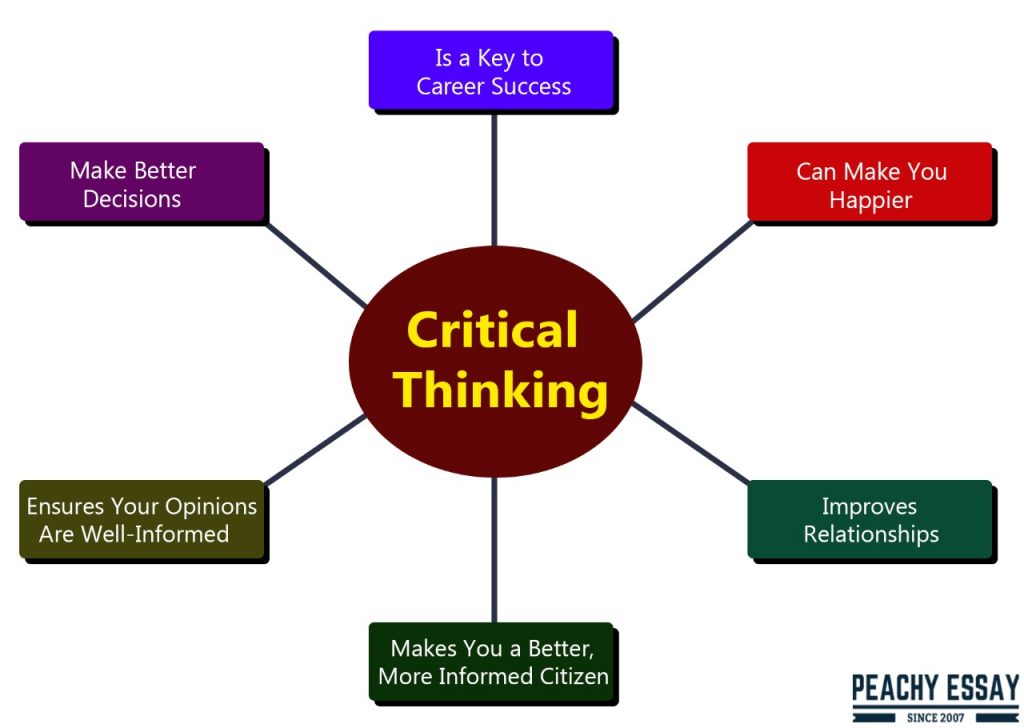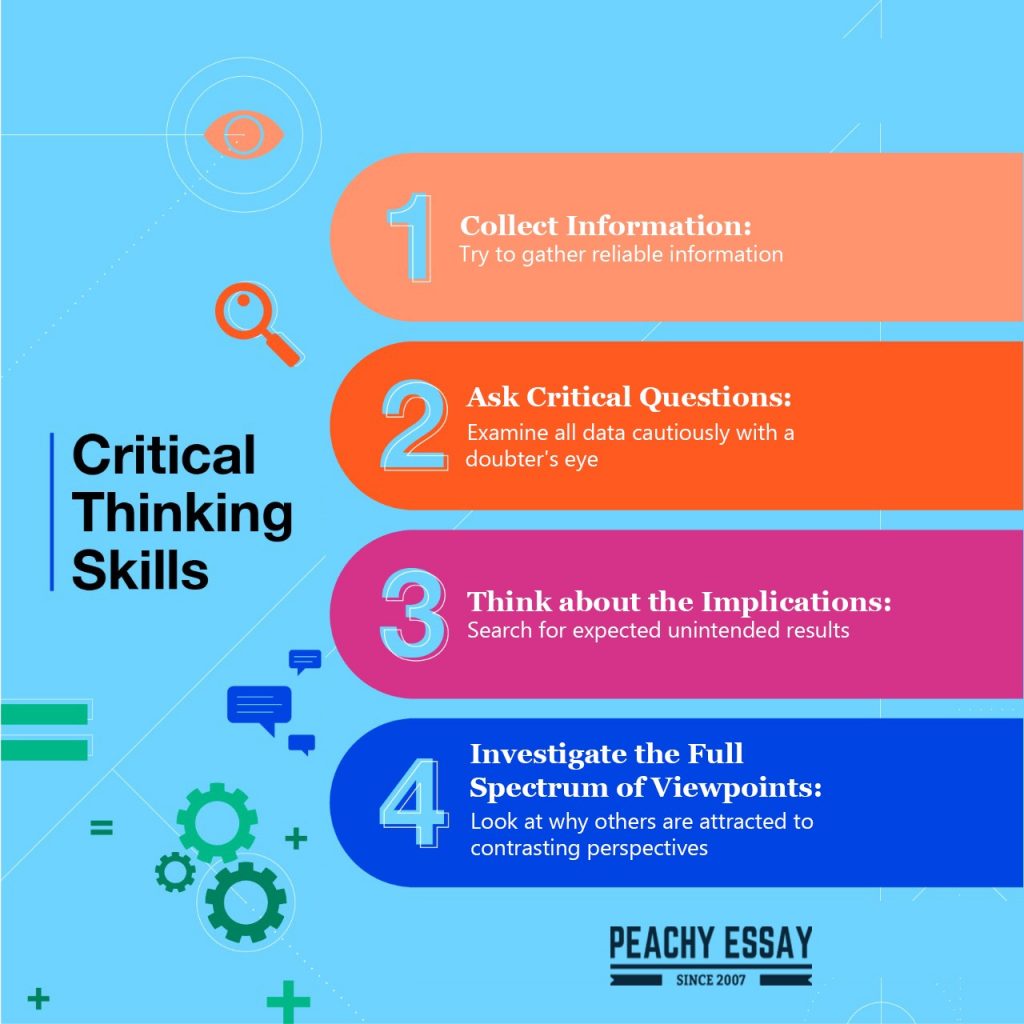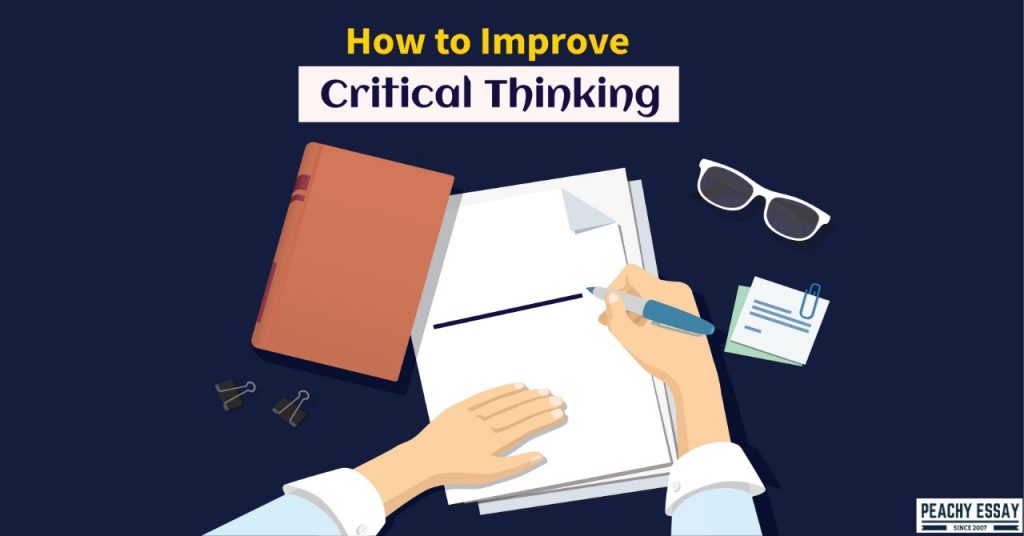The choices that you make influence your quality of life. Furthermore, if you need to ensure that you live your best and upbeat life, you will have to make good choices. That should be possible through critical thinking.
What is critical thinking?
Critical thinking entails analyzing data to find the best solution to a question or issue. By drawing upon your own thinking, perception, and correspondence with others, you can settle on informed decisions that yield positive solutions.
Critical thinking is the capacity to think in a coordinated and objective way to comprehend associations among thoughts as well as realities. It causes you to choose what to have faith in. It is recognizing, analyzing, and afterward fixing defects in the manner in which we think.
How Is Critical Thinking Different To Problem Solving?
We regularly utilize the word ‘critical’ when we are discussing a crisis. However, you can evaluate some basic intuition in any circumstance, not simply crises!
Critical thinking encompasses questioning information and thinking regarding it from various perspectives. Take a look at all the data and all the various contentions prior to finding an answer, not exactly what appears to be simplest or what you most need to occur. As a critical thinker, you have to consider yourself an analyst attempting to get all the data and discover a gap in a story.
Why Is Critical Thinking Important?
We absorb such a lot of data from such countless better places. To try not to get tricked by ‘counterfeit news’ we must have the option to work out what proclamations are valid and what individuals’ thought processes may be for revealing to you something. We have all been deceived by a deceptive article title or been advised which telephone to purchase because the salesman just has that one in stock, not because it’s ideal for us.
Knowing all the data helps us to settle on more informed choices and see things from various perspectives. We don’t need to all concur, but understanding why others think distinctively encourages us to be more understanding. You can consider it a similar path as when you see a story via web-based media – do you trust it straight away or do you consider whether it is 100% valid, who may have composed it, and why?
Critical Thinking for Students
Papers will frequently expect you to set out a contention and show your process for settling on a choice. When you are taking a look at a task you need to figure: what does the data advise you, who dissents, and why? What else may you need to know? This is critical thinking!
We can utilize critical thinking for a portion of the unavoidable issues of politics. We can use critical thinking to meditate over large thoughts like ‘college ought to be free for everybody’ or ‘medical attendants should all get paid twofold the thing they are being paid at this point’. With these assertions, you need to investigate the explanations behind and against and see whether any specialists or analysts have composed or completed studies on what might occur if we did both of these things. You will develop a contention for the two sides and settle on your choice depending on what you have found.
Critical Thinking in the Workplace
Bosses need employees who can investigate information and settle on a fair choice. You need to consider whether the appropriate response is a convenient solution or whether what you pick will fix the issue for the long term. Great supervisors can comprehend a subject from all points and will be better ready to help a group of people with various perspectives, so critical thinking abilities are something you need to begin working on in the event that you have your sights set on being in control.
How to Build Your Critical Thinking Skills
Do your research and think around the subject and read from various reliable sources. You should be seeing who disagrees and who might do things differently. Is there any proof of something specific working?
Pose inquiries: never be reluctant to pose inquiries. Start with the nuts and bolts and furthermore question what else you may have to know – do you have enough data to settle on a choice.
Assess evidence– Think about what evidence is behind the various perspectives and how significant and believed that proof is.
Major Benefits of Good Critical Thinking Skills
Regardless of whether you think critically or not can make the difference between success and failure in just about every area of your life. Our human minds are defective and inclined to mindlessness, bends, biases, and psychological predispositions.
Critical thinking will help you move past the impediments of unreasonable reasoning.
Here are the absolute most significant ways critical thinking can affect your life.

-
Critical Thinking Is a Key to Career Success
There are numerous professions where critical thinking is an essential requirement. Legal counselors, investigators, bookkeepers, doctors, designers, correspondents, and researchers should apply critical thinking much of the time.
Yet, critical thinking is a range of abilities that are getting progressively important in a developing number of professions.
-
Critical Thinkers Make Better Decisions
Every day you make thousands of decisions. The greater part is made by your psyche and a couple, like which shoes to wear today, don’t need a lot of thought.
However, the main choices you make can be hard and require a great deal of thought, for example, when or in the event that you should change occupations, migrate to another city, purchase a house, get hitched, or have children.
At work, you may need to settle on choices that can modify the course of your vocation or the lives of others.
Critical thinking encourages you to adapt to regular issues as they emerge. It encourages you to figure out the overabundance of information and data accessible, making you a more astute shopper who is more averse to succumb to promoting publicity, peer pressing factors, or tricks.
-
Critical Thinking Can Make You Happier
Knowing and understanding yourself is an undervalued way to happiness. We’ve just perceived how your personal satisfaction generally relies upon the nature of your choices, yet similarly as significant is the nature of your thoughts.
Critical thinking is a fantastic apparatus to help you better get yourself and to figure out how to dominate your thoughts. You can utilize basic speculation to liberate yourself from psychological predispositions, negative reasoning, and restricting convictions that are keeping you down in any part of your life.
Critical thinking can assist you with surveying your qualities and shortcomings so you understand what you have to bring to the table others and where you could utilize improvement.
Critical thinking will empower you to more readily communicate your ideas, thoughts, and convictions.
Better correspondence helps other people to comprehend you better, bringing about less dissatisfaction for both of you.
Critical thinking cultivates imagination and out-of-the-case feelings that can be applied to any part of your life. It gives you a process you can depend on, making decisions less distressing.
-
Critical Thinking Ensures Your Opinions Are Well-Informed
We access more data than ever before. Astoundingly, more information has been made in the previous two years than in the whole past history of humankind.
Basic reasoning ensures your opinions are well informed and dependent on the best accessible realities. You’ll get a lift in certainty when you see that everyone around you trust your opinions.
-
Critical Thinking Improves Relationships
Utilizing critical thinking makes you more receptive and better ready to comprehend others’ perspectives. Critical scholars are more compassionate and in a superior situation to coexist with various types of individuals. Critical thinking shields you from forming a hasty conclusion, and you can be relied on to be the voice of reason when a problem needs to be solved.
-
Critical Thinking Makes You a Better, More Informed Citizen
Critical thinkers can see the two sides of any issue and are bound to create bipartisan solutions. They are more averse to be influenced by propaganda or get swept up in mass hysteria. Additionally, they are in a superior situation to spot counterfeit news when they see it.
Instructions to Improve Your Critical Thinking Skills
Here is how to improve your critical thinking skills.

-
Collect Information to Help You Weigh the Options
Ensure you gather reliable information from the most reputable sources.
-
Ask Critical Questions
Examine all data cautiously with a doubter’s eye.
Not certain what inquiries to pose? You can’t turn out badly beginning with the “5 Ws” that any great specialist asks: Who, What, Where, When, and Why. Then finish by asking “How.”
-
Think about the Implications
Search for expected unintended results. Do a psychological test about how your answer could happen in both the short term and the long run.
-
Investigate the Full Spectrum of Viewpoints
Look at why others are attracted to contrasting perspectives. This will assist you in assessing your own perspective.
You may find critical thinkers who take a contradicting perspective and this can help you discover gaps in your own rationale.
Read more: How to Write a Rogerian Argument Essay
Ways to Think More Critically
Here are the ways that can help you think more critically.
-
Pose Basic Inquiries
Now and again a clarification turns out to be unpredictable to such an extent that the first inquiry gets lost. To stay away from this, persistently return to the fundamental inquiries you posed when you set out to tackle the issue.
Here is a couple of key fundamental inquiry you can pose to when moving toward any issue:
What do you definitely know?
How would you realize that?
What are you attempting to prove, invalidate, illustrated, evaluate, and so forth?
What are you disregarding?
Probably the most amazing answers for issues are bewildering, not due to their multifaceted nature, but because of their simplicity.
-
Question Basic Assumptions
The above saying remains constant when you’re thoroughly considering an issue. It’s very crucial to scrutinize your basic assumptions.
The most prominent pioneers in mankind were the individuals who essentially searched up briefly and contemplated whether one of everybody’s overall presumptions wasn’t right.
You don’t need to be a hopeful Einstein to profit by scrutinizing your assumptions. That outing you’ve needed to take? That hobby you’ve needed to attempt? That internship position you’ve needed to get? That alluring individual in your World Civilizations class you’ve needed to converse with?
Every one of these things can be a reality in the event that you simply question your suppositions and basically assess your convictions about what’s reasonable, proper, or conceivable.
-
Know about Your Mental Processes
The human idea is astonishing, yet the speed and computerization with which it happens can be a burden when we’re attempting to think fundamentally. Our cerebrums normally use heuristics (mental alternate ways) to clarify what’s going on around us.
This was useful to people when we were chasing the enormous game and fending off wild creatures, however, it tends to be grievous when we’re attempting to conclude who to vote for.
A critical thinker knows about their intellectual inclinations and individual biases and how they impact apparently “objective” choices and solutions.
We all have biases in our thinking. Getting mindful of them is the thing that makes critical thinking conceivable.
-
Take a stab at Reversing Things
An incredible method to get “unstuck” on a difficult issue is to take a stab at switching things. It might appear glaringly evident that X causes Y, yet imagine a scenario where Y caused X.
Regardless of whether incidentally, the opposite isn’t accurate, considering it can show you the way to finding an answer.
-
Assess the Existing Evidence
When you’re attempting to take care of an issue, it’s consistently useful to take a look at other work that has been done in a similar region. There’s no motivation to begin taking care of an issue without any preparation when somebody has laid the foundation.
It’s significant, however, to assess this data fundamentally, or, in all likelihood, you can without much of a stretch arrive at some unacceptable resolution. Pose the following questions of any evidence you experience:
Who collected this proof?
How could they collect it?
Why?
Take, for instance, an investigation indicating the medical advantages of sweet grain. On paper, the study sounds pretty persuading. That is until you discover that a sweet grain organization funded it.
You can’t consequently expect that this refutes the investigation’s outcomes, yet you ought to surely address them when a conflict of interests is so apparent.
-
Make sure to think for yourself
Try not to get so impeded in exploration and perusing that you neglect to think for yourself–in some cases this can be your most integral asset.
Try not to be pompous, however, perceive that intuition for yourself is fundamental to addressing intense inquiries. I discover this to be the case when composing articles it’s so natural to lose all sense of direction in others’ work that I neglect to have my own thoughts. Try not to commit this error.
-
Comprehend That No One Thinks Critically 100% of the Time
You can’t think critically throughout time, and that is OK. Critical thinking is a device that you ought to send when you need to settle on significant choices or take care of troublesome issues; however, you don’t have to contemplate everything.
Also, even with insignificant issues, you will encounter lapses in your thinking. What makes a difference is that you perceive these breaches and attempt to evade them later on.


